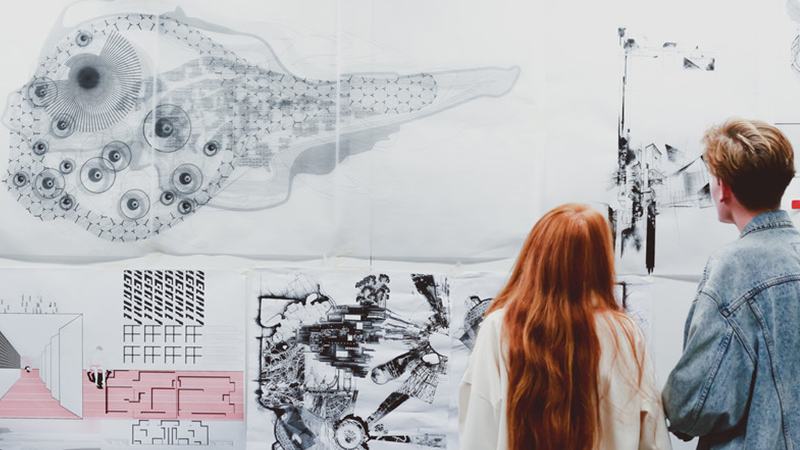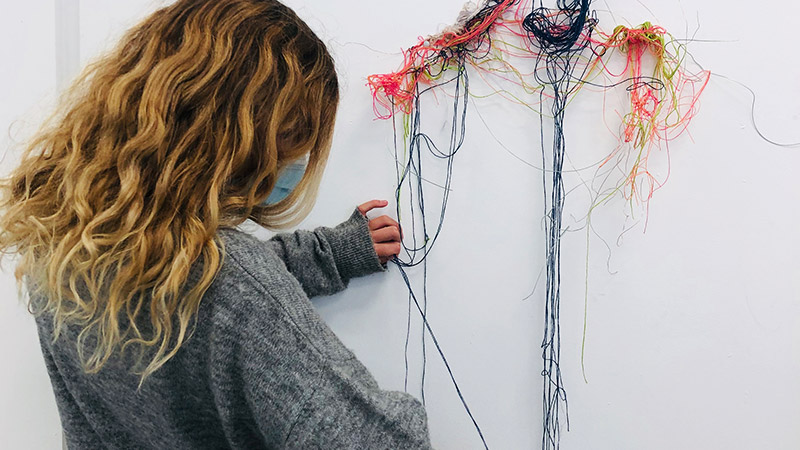UAL Level 3 Foundation Diploma in Art and Design
Foundation Diploma
Key facts
School(s)
UCAS Tariff Points
32
Overview
The UAL Level 3 Foundation Diploma in Art and Design course introduces you to a wide range of creative practices.
You will experience a broad range of projects to help you prepare for further study or employment. You will develop your independent creative thinking and learn to apply this across a range of disciplines. You will gain a broad understanding of the creative industries and the career paths across the sector.
You will be supported to develop a portfolio of work, ready for applications to undergraduate courses or creative roles.
This course is based in the School of Arts which is home to a range of specialist facilities including:
- printmaking workshops
- letter press
- video editing
- photographic studios and darkrooms.
Have a look at our UAL Level 3 Foundation Diploma in Art and Design Instagram channel.
Oxford Brookes University is an approved centre for the UAL Awarding Body for Foundation Diploma in Art and Design.

Oxford Brookes was rated ‘outstanding’ for Foundation Art and Design by OFSTED.


How to apply
Wherever possible we make our conditional offers using the UCAS Tariff. The combination of A-level grades listed here would be just one way of achieving the UCAS Tariff points for this course.
Standard offer
UCAS Tariff Points: 32
A Level: N/A
IB Points: N/A
BTEC: PP
Further offer details
We welcome applications from candidates with equivalent alternative qualifications, and from mature students.
Entry requirements
Specific entry requirements
GCSE: GCSE: Mathematics (grade C/4 or above)
Please also see the University's general entry requirements.
Selection process
Portfolio guidelines
What we are looking for:
Research and idea development - sketchbooks, research on artists and designers, studies and preparatory work. Show all stages of how you have got from a starting point to a final piece. The journey you have embarked upon to achieve the final outcome is very important therefore present the development stages of your project.
Range of materials, media and approaches – experiment with material using mixed media, making samples, models etc. Include evidence of both 3D and 2D work. All larger pieces and 3D work should be photographed.
Include inspiration, references and research - Are there any galleries, exhibitions or events you have visited that have been influential? How do you stay current and up to date with contemporary art and design? What do you hope to gain from studying a Foundation Diploma course? And what are your aspirations for the future? We also like to know a little bit about what you do outside of art and design, such as hobbies, interests, and other influences.
Creativity and problem solving - we will look at the range of media, techniques and processes you have used and that are central to your work. This could include for example, drawing, painting, collage, photography, model-making, textiles or printmaking. We are aware that the range you are able to demonstrate will depend on your current studies but we do like to see diversity in your work so it is best to show more than one approach or use of media.
We are interested to see how you develop your ideas, what informs them? How you identify problems and make decisions in order to solve them. We will typically see this through sketchbook pages, idea/design development work, trials, samples and experiments (2D and 3D).
Portfolio preparation course
We offer short courses to provide a picture of the foundation course through taster experiences of the kind of work that our foundation students undertake. The courses also provide guidelines for the selection and presentation of a portfolio for interview for a place on Art and Design foundation courses.
English language requirements
Please also see the University's standard English language requirements.
English requirements for visas
If you need a student visa to enter the UK you will need to meet the UK Visas and Immigration minimum language requirements as well as the University's requirements. Find out more about English language requirements.
Terms and conditions of enrolment
When you accept our offer, you agree to the Terms and Conditions of Enrolment. You should therefore read those conditions before accepting the offer.
Credit transfer
Many of our courses consider applications for entry part-way through the course for students who have credit from previous learning or relevant professional experience.
Find out more about transferring to Brookes. If you'd like to talk through your options, please contact our Admissions team.
Application process
Applications are now open for Home and International students for September 2024 and September 2025.
Please apply directly to the University using our online application system. You cannot apply for this course through UCAS.
We encourage you to apply as soon as possible so we can consider your application.
If you live in the Channel Islands, Wales, Scotland or Northern Ireland, please read this guidance regarding funding.
If you are expected to meet the requirements for the course, you will be invited by email to submit your portfolio for review.
Tuition fees
Questions about fees?
Contact Student Finance on:
Tuition fees
How and when to pay
Tuition fee instalments for the semester are due by the Monday of week 1 of each semester. Students are not liable for full fees for that semester if they leave before week 4. If the leaving date is after week 4, full fees for the semester are payable.
- For information on payment methods please see our Make a Payment page.
- For information about refunds please visit our Refund policy page
UK students that are aged 18 or under on the 31st August immediately before this course starts do not have to pay tuition fees.
Additional costs
Please be aware that some courses will involve some additional costs that are not covered by your fees. Specific additional costs for this course are detailed below.
Compulsory costs
| Additional costs | Amount (£) |
|---|---|
| Consumable art materials and printing costs in addition to what is provided in order to extend your projects. | £10 per week |
| The Materials Fee is payable when you enrol. This will include basic paper and drawing supplies for the year, specialist materials for workshops in unit one and two of the programme, and the cost also of two gallery visits during the academic year. | £160 |
| Final Major Project | £30-200 |
Optional costs
| Additional costs | Amount (£) |
|---|---|
| Cost of photography and mounting materials in the preparation of your portfolio for UCAS interviews. | £45-100 |
European or international field trip |
£350-600 |
UK field trip |
Typically £150-400 |
It’s your responsibility to cover print / binding costs where coursework submission is required. Please note that a lot of the coursework is now submitted online. |
From £30 |
| You may choose to purchase books to support your studies. Many books on our reading lists are available via the Library, or can be purchased secondhand. | £20-60 per book |
Accommodation fees in Brookes Letting (most do not include bills) |
£107-301 per week |
Accommodation fees in university halls (bills included, excluding laundry costs) |
£139-248 per week |
Students are responsible for their own travel to and from university for classes. For the 2025/26 academic year, the University is introducing an alternative subsidised travel offer for all students with further information on our Travel webpages. |
From £10 |
Funding your studies
Financial support and scholarships
Featured funding opportunities available for this course.
Please note there are no tuition or maintenance loans available for this course from the Student Loans Company because it is level 3 and not an undergraduate programme.
All financial support and scholarships
Learning and assessment
The course is divided into 3 units:
- Diagnostic Investigation – you'll be introduced to a wide range of approaches. How you respond to these projects will help you understand how you work and what you are most interested in pursuing creatively.
- Developing Specialist Practice – you'll be supported in making an application to university, creating a portfolio and going through interviews, while also being involved with collaborative projects with employers.
- Consolidating Practice – in this final unit you will write and develop your own personal project and exhibit it in our end of year exhibition.
To find out more about the academic calendar, visit our semester dates web page.

Learning and teaching
When not attending timetabled sessions, you will be expected to continue learning independently through self-study. This typically will involve drawing in your sketchbook, reading journal articles and books, and working on individual and group projects. Your independent learning is supported by a range of excellent facilities, including:
- online resources
- the library
- Moodle, the online virtual learning platform.
Field trips
Field trips also form part of the course. Recent destinations have included the Eden Project in Cornwall, Copenhagen, Tallinn, Berlin and Venice.
The field trips to the Eden Project and a European destination are payable by you to cover the costs of accommodation and travel. In addition, you will need to cover the costs of living in Europe and we would recommend a budget of 50 euros per day. In Cornwall, accommodation is likely to be full board.
A trip to London to see museums and galleries will be covered by your studio fee and you will not be asked to cover travel or entrance fees. However, you will need to either provide your own lunch or buy it whilst there and we would budget for approximately £5.
Assessment
Assessment methods used on this course
The Foundation Diploma in Art and Design award is based on passing all three parts of the course, and on completion of 120 credits. Each part should be passed. You'll be formally assessed at the end of each part in order to proceed to the next stage.
You will participate in reflection, evaluation and assessment. The emphasis is on continual feedback, which ensures a high level of communication between you and your tutors. Contextual work is fully integrated and designed to inform your practical work, this includes theme-based lectures, talks from practising artists and designers, and field visits to museums.
Additional learning support
The learning support tutor meets regularly with students who have a learning need such as Dyslexia or Dyspraxia. All students can request tutorials as required. Topics range from reflective writing to personal statements and understanding the principles of research. All students are screened for Dyslexia when they start the course.
Our Staff
Dr Alexandra Trott
Alexandra teaches topics on art theory and practice, covering Modern, Postmodern, and Contemporary art.
Read more about AlexandraRelated courses
Programme changes:
On rare occasions we may need to make changes to our course programmes after they have been
published on the website. For more information, please visit our
changes to programmes page.
